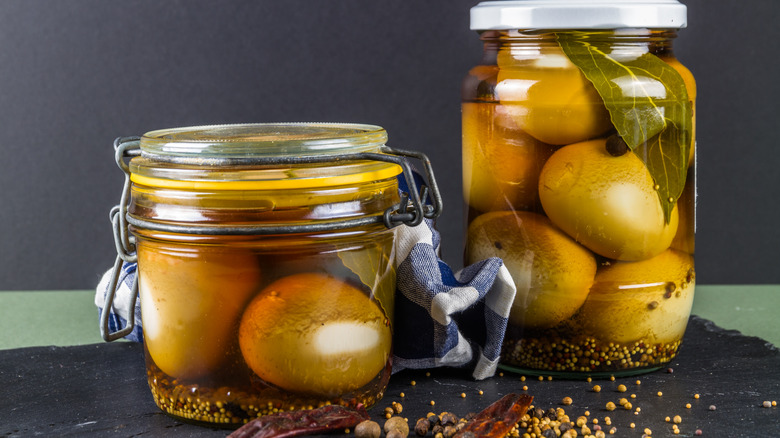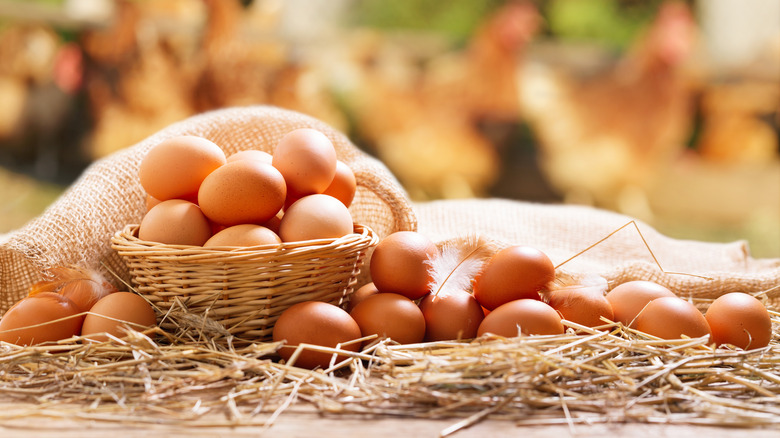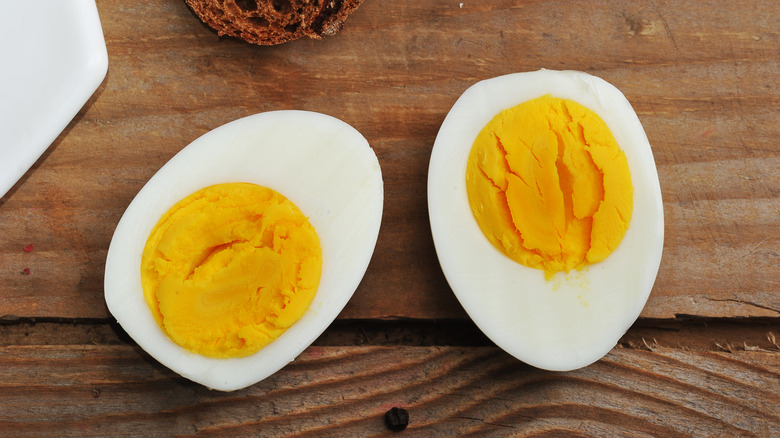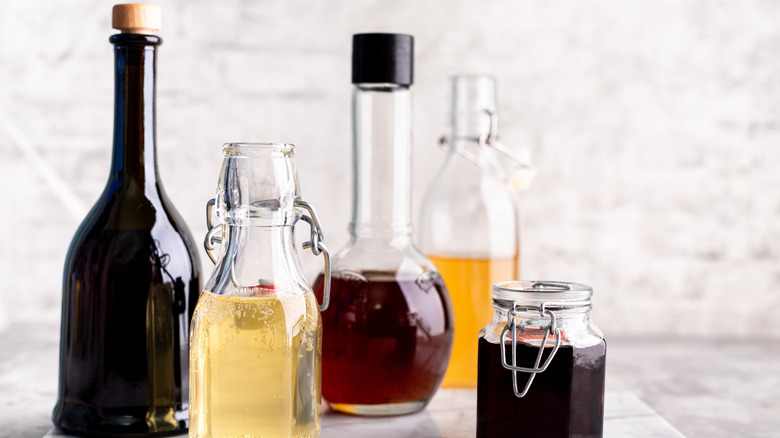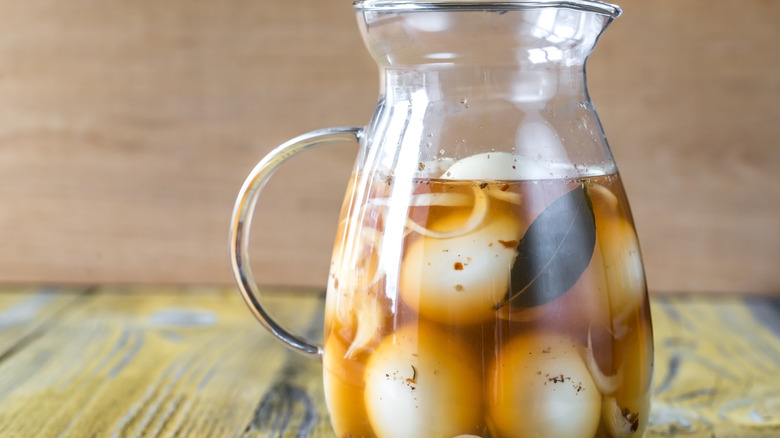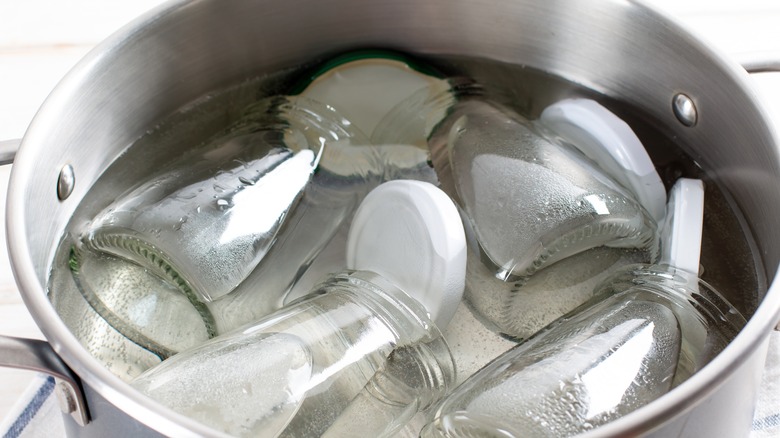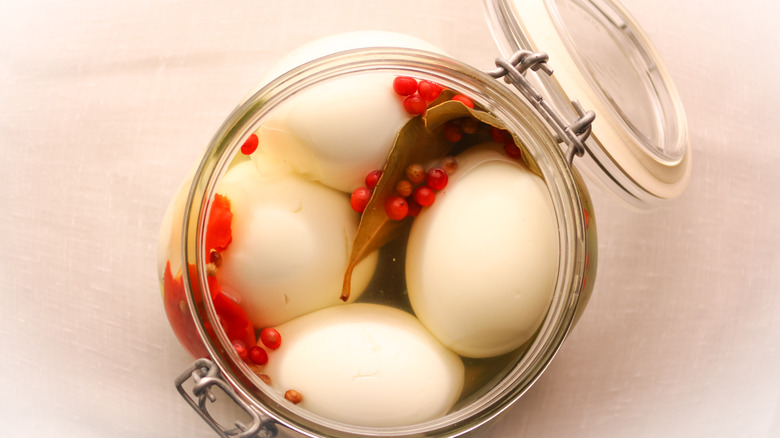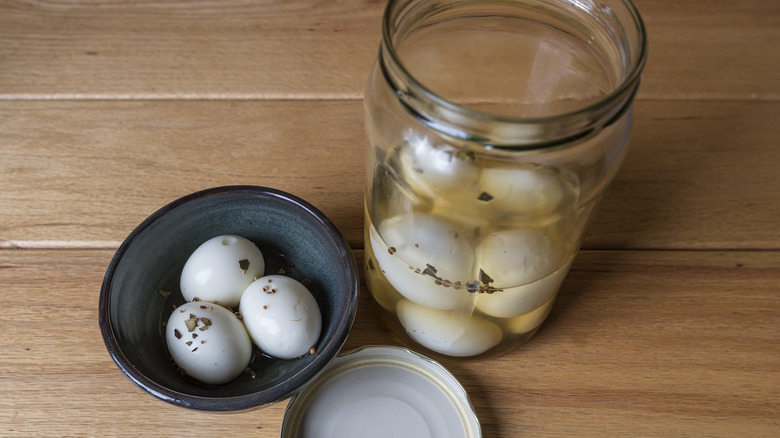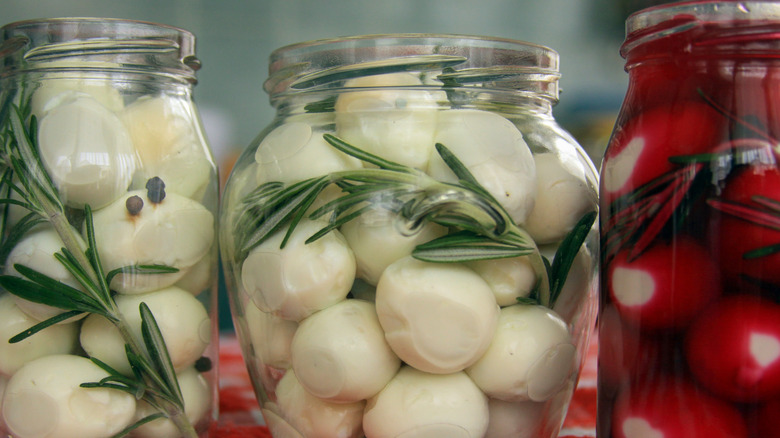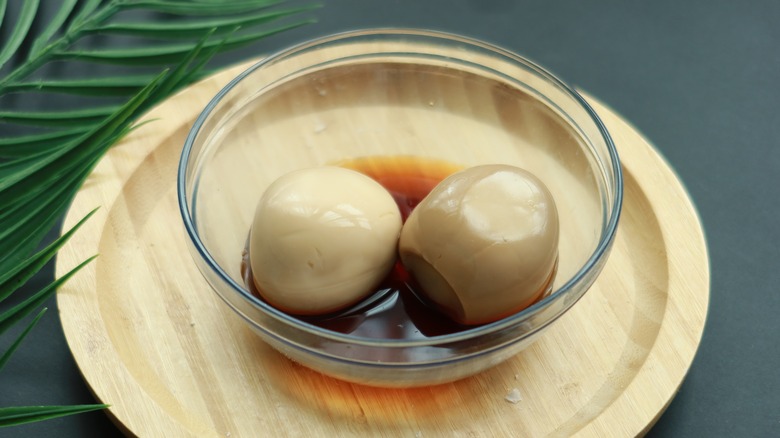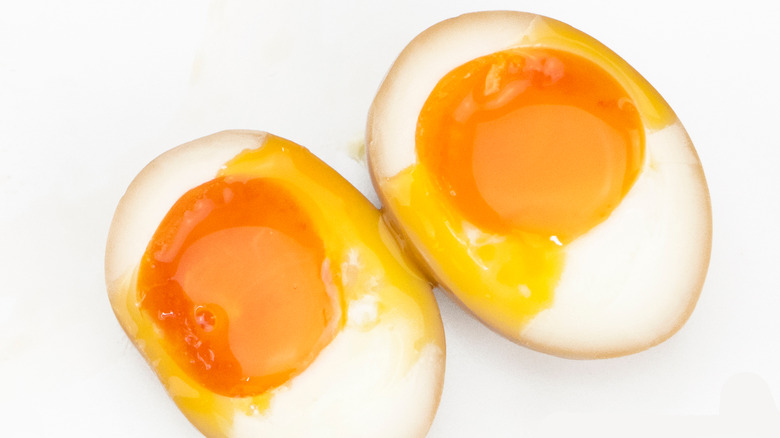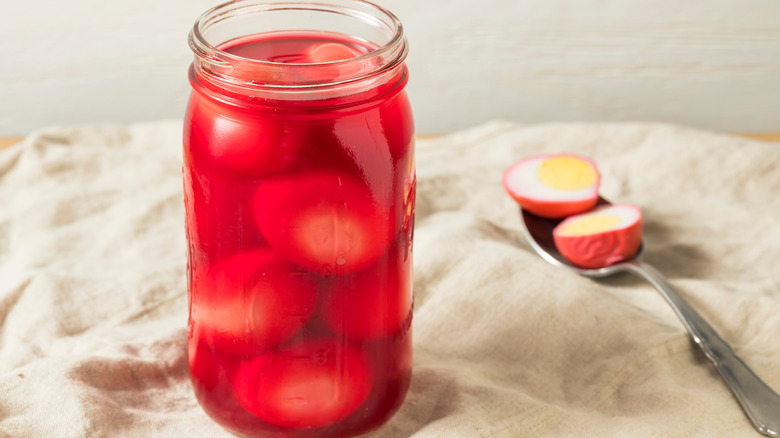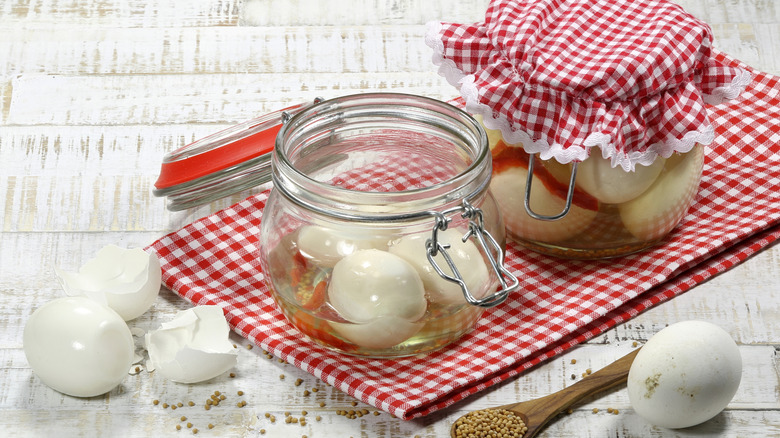12 Tips You Need When Making Homemade Pickled Eggs
Love or hate them, pickled eggs are an interesting food with die-hard fans but also with people who dislike them. Once a popular appetizer and bar snack, they were subject to a decrease in popularity. But, as today's food trends made home pickling popular again, pickled eggs have regained some appeal.
According to Wisconsin State Farmer, pickled eggs were one of the foods the Pilgrims brought on the Mayflower when they arrived in 1620. Back in Europe, pickled eggs were popular in German and British cooking, as they represented the simplest solution to storing eggs and a way of consuming them months after the egg was laid. The taste of pickled eggs comes from the ingredients used in the pickling solution, and that's where you can get creative. Pickling also preserves the nutritional profile of the egg, per BioWellBeing. If you're intrigued by this snack from the past which regained popularity, here are some tips on how to make pickled eggs.
Choose high-quality, safe eggs
Choosing the right eggs for pickling can be daunting, especially when matching your preferences to the eggs recommended. Understanding the basics of egg selection is essential if you want the best quality eggs. You can pickle any kind of egg, but note that smaller eggs are a better choice, as the seasoning will lend its aroma to the egg. That doesn't mean that larger eggs won't be good when pickled, it's just that they won't have such a strong flavor as smaller eggs.
The first step in selecting eggs is to know what chickens eat. Chickens that are fed a healthy diet will lay better-tasting and higher-quality eggs. Look for labels that indicate free-range or organic-fed. Next, look at the color of the eggshells; brown or white varieties are available in most stores. Brown shells are thicker than white ones, which may also mean that the eggs have more flavor. Also, pay attention to the age of the eggs; older ones may have cracked shells or smell bad when open. One of the essential egg safety tips is to avoid buying eggs that have cracks in the surface, as it's very easy for bacteria to find their way inside the egg through the cracks. Finally, when making home-pickled eggs, check the expiration date on the carton and try not to use the eggs if it's past that date, as pickling them means that you will store them for a while.
Learn how to hard-boil eggs
The first step in making home-pickled eggs is boiling the eggs. Although it seems very simple, making the perfect hard-boiled egg requires a bit of exercise as there are some factors you need to consider. How you store the eggs in the refrigerator and the age of the eggs are two significant factors (you should store the eggs upside down). Then, make sure you use a large pot and cook the eggs for about 12 minutes if they are large and 10 minutes if they are small. Place the eggs in the boiling water gently, and only measure the time after you've placed them. After they are cooked, place them in an ice bath and let them cool.
If the process seems too daunting, there are alternative methods you can try for hard-boiling eggs. For example, you can use an air fryer or an Instant Pot. For the air fryer, place the eggs in the basket and set it to 250 degrees Fahrenheit for 15 minutes. You will have perfectly cooked hard-boiled eggs that are not dry, overcooked, or rubbery. For cooking in the Instant Pot, you need to add a cup of water and the eggs and set the appliance to manual mode with high pressure for five minutes. After that, place the eggs in an ice water bath to stop the cooking process and make peeling easier.
Choose the right vinegar for pickling
Choosing the right vinegar for pickling eggs is essential to achieve the desired flavor. Different types of vinegar are available, such as white, apple cider, and balsamic vinegar. Each type of vinegar has its unique taste and can be used to pickle eggs differently.
White vinegar is a popular choice for pickling eggs because it has a mild flavor that does not overpower the taste of the eggs. It also helps to preserve the egg's color and texture. On the other hand, white vinegar is acidic and has a tangy flavor that pairs well with raw vegetables. It's also the best choice for pickling eggs because other ingredients will not compete with it or mask its taste. Actually, it's the type of vinegar that is mainly used for pickling anything, as it works with different flavors and herbs. Also, it will allow the pickled ingredient to preserve some of its natural flavors.
You can also try using apple cider vinegar or balsamic vinegar to pickle eggs. Apple cider vinegar has a slightly sweet taste that can add depth to pickled eggs. Balsamic vinegar is more acidic than other kinds of vinegar and has a strong flavor that can be overwhelming. When choosing a type of vinegar for pickling eggs, consider how much acidity you want in your dish and how much flavor you want it to have. You should also consider other ingredients, like sugar, and what flavor you plan to use.
Avoid storing pickled eggs for too long
Pickled eggs are a delicious and healthy snack that can be stored for long periods. Pickling eggs is an excellent way to keep eggs if you have more on hand, as it guarantees that you can use them for longer than if you store them fresh. But how long is it safe to store pickled eggs? The answer depends on the type of egg and your preferences regarding the flavor intensity. Small eggs require less time to season and borrow all the flavors you used in the pickling solution. You can eat them a few hours after pickling if you want a lighter flavor, but they're best if kept in the refrigerator for at least a week. If you are using larger eggs, they will require two to four weeks to be well seasoned.
Pickled eggs will last up to three months if you keep them in the fridge. However, you should always stay on the safe side and avoid eating pickled eggs that you have had for too long or have been sitting out for a longer time, as consuming them can lead to food poisoning.
Sterilize the jars for pickled eggs
Pickled eggs are best kept in sterilized and sealed containers. According to the National Center for Home Food Preservation, glass canning jars are perfect for storing pickled eggs. The eggs need to be covered entirely with the pickling solution; otherwise, they won't have any flavor and will go bad quickly. Per official recommendations, all products processed for less than 10 minutes should be filled into empty sterile jars.
Sterilizing jars is quite simple: Wash the jars with soap and hot water, put them in a water canner, fill the canner and the jars with water (it should cover the jars), and boil them for at least 10 minutes. You can also run a dishwasher cycle without detergent or place the jars in an oven to low heat before boiling them. In addition to sterilizing the jars before filling them with food, you should also pasteurize them after the pickled eggs have been placed inside and covered with the pickling solution. For pasteurization, seal the jars and return them to the water bath canner (save the water from sterilizing). Boil them for 10 minutes, which is enough time for the heat to kill the most dangerous bacteria which could be present in the food or the brine.
Seal the pickled eggs container properly
When you pasteurize the pickled egg jars by boiling, you take care of another important aspect of the pickling process. In addition to ensuring all bacteria is gone, boiling the closed jars also tightens the seal, an aspect crucial when storing pickled eggs. It's essential to avoid making mistakes when pickling eggs because a container that is not properly sealed can pose the risk of the food being contaminated from the outside. To ensure that your jars are sealed, use airtight metal lids with screw-on collars and avoid reusing the lids. Also, when you boil the jars, don't fill them up to the top, as you need a little room for the contents while pasteurizing.
Another way to seal the pickled egg jars is to use a vacuum sealer. Reorganize All suggests using vacuum-sealing containers to store the liquid brine and avoiding vacuum-sealing bags. When vacuum sealing (and generally, when working with food), you should wash your hands before handling any food or object, as bacteria from the hands can easily be transferred. Then, just as with regular canning, place the eggs in the sterilized vacuum seal container, cover them with the pickling solution, and put the lid on, ensuring it's perfectly closed. Also, ensure the container is not too full and follow the vacuum seal producer's instructions.
Flavor pickled eggs with spices and onions
The classic brine for pickling eggs uses vinegar and an array of spices to get that unique flavor. Adding onions will make the brine and the pickled eggs sweeter, nicely contrasting with the tang that characterizes vinegar. You can use your favorite spices to make the brine or try a premade combination, such as pickling spice. The most common spice ingredients include coriander, peppercorns, mustard seed, allspice, bay leaves, cloves, and red pepper flakes.
Try this recipe for classic pickled eggs to see how the spice, onions, and vinegar combination works with eggs. First, you'll need to boil the eggs before you pickle them. Then, prepare the ingredients; you'll need eggs, fresh dill, thinly-sliced red onion and garlic, bay leaves, salt, sugar, rice vinegar and white vinegar, a little water, and pickling spice. To make the brine, put the sugar, salt, pickling spice, water, and vinegar in a small pot and let it come to a boil over medium-high heat. Once it's boiling, turn off the heat and let it cool down. Now you're ready to add everything to a jar. Add the eggs, onion, and dill to the jar, pour in the brine, and seal. For extra-flavorful pickles, wait a few days before consuming them. You can also add soy sauce for a different twist on the pickles.
Lend pickled eggs a touch of herbal aroma
Another way to flavor eggs pickled in vinegar is to add more herbs to the brine. Herbs with a strong aroma will lend their flavor to the brine and the pickled eggs and add another layer of taste. You can try using thyme, tarragon, fennel seeds, basil, or any other flavorful herb you enjoy.
This herby pickled egg recipe uses fresh thyme and fresh tarragon. To begin, you will need six eggs, white wine vinegar, sugar, fresh thyme, tarragon, garlic, fennel seeds, and peppercorns. Heat the vinegar, sugar, garlic, fennel seeds, and peppercorns together for five minutes until the sugar has dissolved to create the pickling liquid. Next, place the fresh thyme and tarragon into the jar with the peeled eggs and then pour over the cooled pickling liquid. For extra flavor, consider adding a bit of soy sauce to the mix before sealing the jar and leaving it for at least one week in a cool, dark place before consuming the eggs.
Pickle eggs in soy sauce, ramen-style
Vinegar is the traditional pickling solution for pickled eggs, but other options offer variations in flavor and texture. For example, in Japanese-inspired dishes, eggs marinated in soy sauce are often used as ramen ingredients. Unlike vinegar-pickled eggs, eggs marinated in soy sauce are salty, have an umami flavor, and have a creamier texture. Called "shoyu tamago," these eggs have been either soft- or hard-boiled before being marinated in soy sauce. In Japan, these pickled eggs are often enjoyed as a snack and can be added to breakfast dishes, noodles, toast, and more.
To make soy-sauce pickled eggs at home, hard-boil them and set them aside. In a non-reactive container, combine equal parts of water and soy sauce. Place the eggs in the container and let them soak for at least two hours. The eggs' soak duration and marinade ingredients can vary from source to source. For example, some recipes may call for additional seasonings such as mirin, sherry vinegar, sake, ginger, garlic, and more. Additionally, the soy sauce solution can be saved and reused for another batch of eggs. Those with celiac disease or gluten intolerances can use gluten-free soy sauce or tamari instead of regular soy sauce.
Go gourmet and pickle eggs in steak sauce
Another popular ingredient that can add flavor variety to pickled eggs is steak sauce. It adds a unique and savory aroma to the eggs. You can use steak sauce, BBQ sauce, smoked BBQ sauce, or something spicy, such as a spicy BBQ sauce or even Sriracha mixed with your preferred steak sauce.
To try the flavor combination, mix some steak sauce, vinegar, sugar, salt, pepper, garlic powder, and onion powder in a large bowl. You can use other ingredients, too, such as jalapeño peppers or Sriracha if you prefer spicy foods. Then add the hard-boiled eggs into the mixture and let them sit overnight or for at least eight hours. The best part about pickling eggs in steak sauce is that it provides an incredibly unique flavor compared to other pickling methods. The taste is multilayered and complex, with hints of sweet, salty, and smoky. The texture of the eggs is also different when they are prepared this way, as they will be softer than those pickled only with vinegar.
Give pickled eggs a splash of color using beet
Pink pickled eggs represent a nice splash of color for any salad or sandwich ingredient combinations. You can get that lovely hue using beets. Pickled eggs flavored and colored with beets have a deep pink color that really adds a visual element to the dish.
To make beet-pickled eggs, you'll need high-quality eggs, red beets, white vinegar, sugar, salt, and yellow onion. Begin by making the brine for the eggs. Then, combine the vinegar, sugar, and salt in a large bowl, and stir until the sugar and salt dissolve.
Next, layer the beets and eggs in a sterilized jar. Start with a layer of eggs, followed by a layer of beets, and repeat this process until all the ingredients are used. Finally, pour in the brine and seal the jar. Leave the pickled eggs for at least two days before they're ready to be served. The longer they sit, the more flavorful and colorful they will be. When you're ready to serve them, drain off the liquid and enjoy. Beet-pickled eggs add a unique flavor and color to any meal. They're perfect for breakfast, added to a salad or a cheese plate, and they'll make an impression on anyone who tries them.
Store pickled eggs correctly
Pickled eggs are a delicious snack that can be enjoyed all year round. However, they must be correctly stored to maintain their flavor and texture. Always ensure that you are using eggs within the safe-to-eat period. Use only tested recipes when you make the pickling solution, and don't just mix random ingredients because some chemical reactions you don't foresee could spoil the pickled eggs. It is also essential to ensure that the eggs are completely covered in brine or pickling solution, as this will help preserve them for extended periods. Sterilize the containers before using them and pasteurize them after filling them with eggs and brine. Also, make sure that the containers are perfectly sealed.
It's best to store pickled eggs in the refrigerator and only take them out before eating. Doing this will keep them cool and prevent any spoilage from occurring due to heat exposure. It is also essential to ensure that the container or jar used for storing the eggs has an airtight lid, as this will help keep out any contaminants and odors from entering the container.
